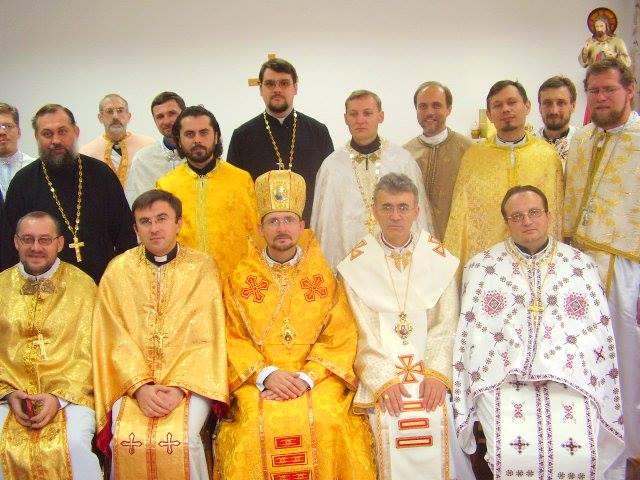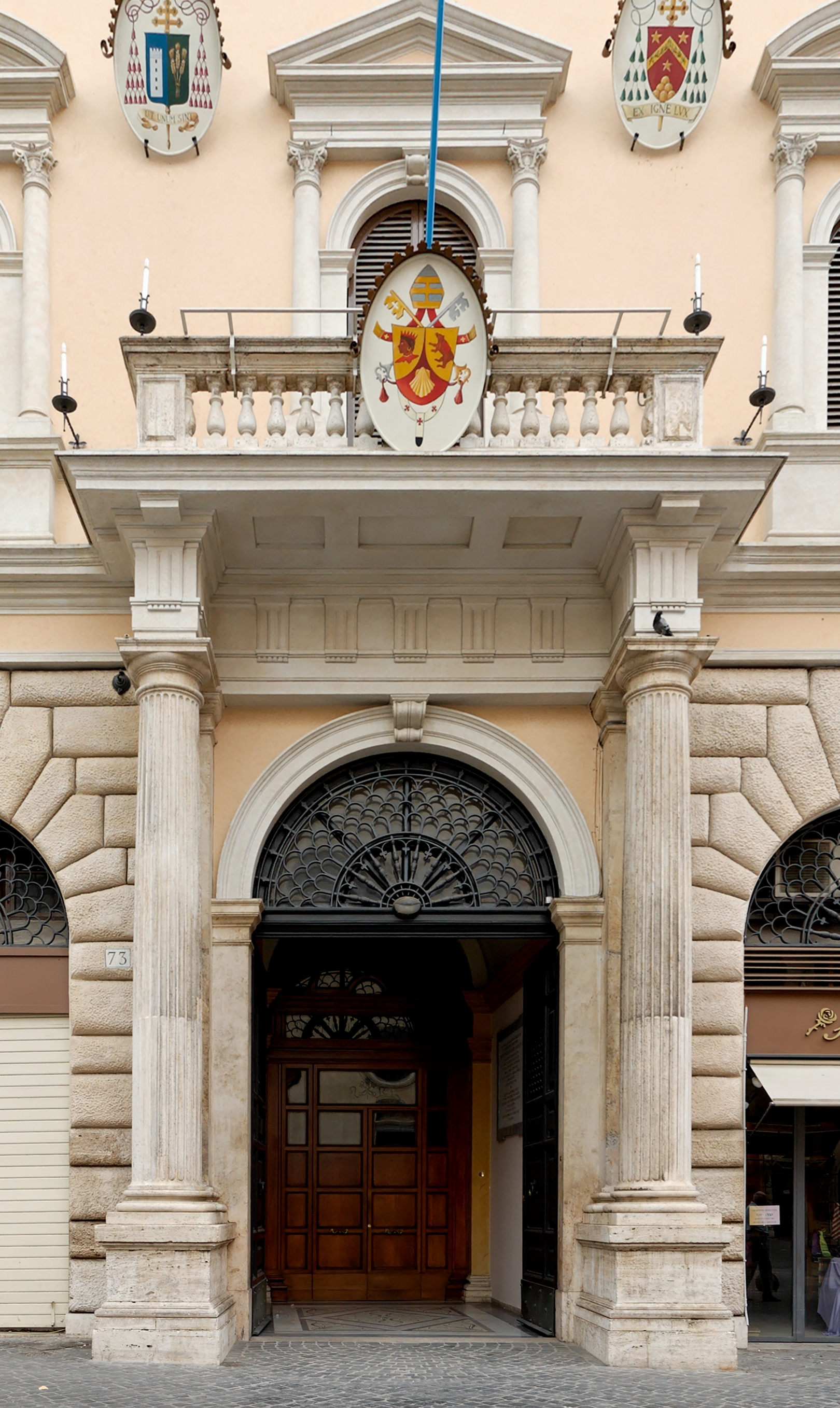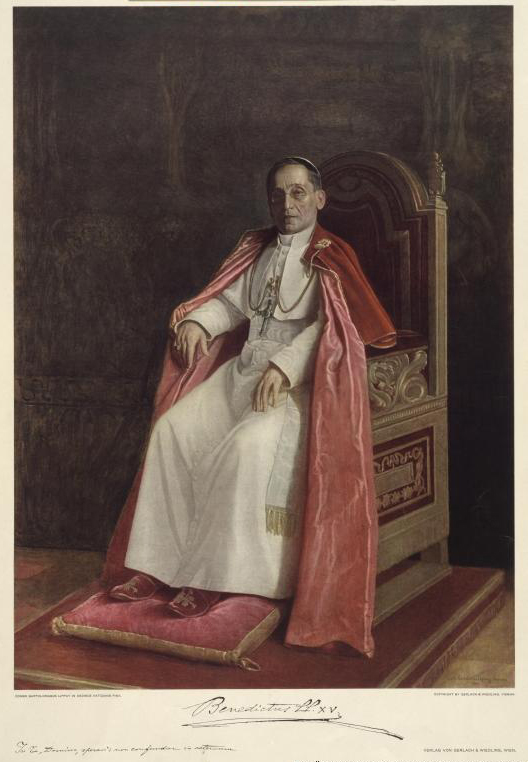|
Russicum
The Collegium Russicum (; ; ') is a Catholic college in Rome, originally founded by Pope Pius XI and dedicated to training priests for the newly organized Russian Greek Catholic Church. It is located near the Basilica di Santa Maria Maggiore, separated from the Pontifical Oriental Institute by the Sant'Antonio Abate all'Esquilino, Church of Saint Anthony, and is known informally as the Russicum. History The college is built on the site of what was once a hospital, created by bequest in 1529, by Cardinal Pietro Capocci. From the middle of the 18th century the hospital was assigned to Camaldolese nuns, who kept it until it was confiscated by the government in 1871. In 1928 the church of Sant'Antonio Abate all'Esquilino and its surroundings were acquired by the Holy See, which assigned the church to Russian Catholics of the Byzantine Rite and the surrounding buildings to the Collegium Russicum. The Russicum, which was founded on August 15, 1929 by Pope Pius XI, was intended to trai ... [...More Info...] [...Related Items...] OR: [Wikipedia] [Google] [Baidu] |
Russian Greek Catholic Church
The Russian Greek Catholic Church or Russian Byzantine Catholic Church is a ''sui juris, sui iuris'' (self-governing) Byzantine Rite Eastern Catholic Churches, Eastern Catholic particular church that is part of the worldwide Catholic Church. Historically, it represents both a movement away from the Caesaropapism, control of the Church by the State and towards the reunion of the Russian Orthodox Church with the Catholic Church. It is in full communion with and subject to the authority of the Pope in Holy See, Rome as defined by Code of Canons of the Eastern Churches. Russian Catholics historically had their own episcopal hierarchy in the Russian Catholic Apostolic Exarchate of Russia and the Russian Catholic Apostolic Exarchate of Harbin, China. In 1907, Pope Pius X appointed Ukrainian Greek Catholic Church, Ukrainian Greek Catholic Metropolitan Andrey Sheptytsky, the Ukrainian Catholic Archeparchy of Lviv, Archbishop of Lviv, to be responsible for supporting Russian Catholics du ... [...More Info...] [...Related Items...] OR: [Wikipedia] [Google] [Baidu] |
Roman Colleges
The Roman Colleges, also referred to as the Pontifical Colleges in Rome, are seminary institutions established and maintained in Rome for the education of future ecclesiastics of the Catholic Church. Many of the colleges have traditionally taken students from particular national or ethnic groups, those from particular regions in Italy, and those from the various Eastern Catholic churches. The colleges are halls of residence in which the students follow the usual seminary exercises of piety, study in private, and review the subjects treated in class. In some colleges there are special courses of instruction (languages, music, archaeology, etc.) but the regular courses in philosophy and theology are given in a few large central institutions, such as Pontifical Urbaniana University, the Pontifical Gregorian University, the Pontifical Lateran University, and the Pontifical University of Saint Thomas Aquinas, known as the ''Angelicum''. Purpose The Roman colleges, in addition to the ... [...More Info...] [...Related Items...] OR: [Wikipedia] [Google] [Baidu] |
Pontifical Oriental Institute
The Pontifical Oriental Institute, also known as the Orientale, is a Catholic institution of higher education located in Rome and focusing on Eastern Christianity. The plan of creating a school of higher learning for Eastern Christianity had been on the agenda of the Catholic Church since at least Pope Leo XIII, but it was only realized in 1917 by Pope Benedict XV. The Orientale forms part of the consortium of the Pontifical Gregorian University (founded in 1551) and the Pontifical Biblical Institute (founded in 1909), both in Rome. All three institutions are run by the Society of Jesus (Jesuits). While the Orientale depends on the Holy See, its management is entrusted to the Society of Jesus. Its chancellor is the Prefect of the Congregation for the Eastern Churches and its vice-chancellor is the superior general of the Society of Jesus, while the Congregation for Catholic Education is the dicastery competent for approving the academic programmes of the Orientale. Each year, ... [...More Info...] [...Related Items...] OR: [Wikipedia] [Google] [Baidu] |
Lionginas Virbalas
Archbishop Lionginas Virbalas, S.J. (born 6 July 1961) is a Lithuanian prelate of the Catholic Church who served as the Archbishop of the Kaunas from 11 June 2015 until 1 March 2019. He was Bishop of the Roman Catholic Diocese of Panevėžys from 6 June 2013 until 11 June 2015. Life Virbalas was born on 6 July 1961 in Biržai, Lithuanian SSR, present day Lithuania), in the Diocese of Panevėžys. After graduating from the local school, he studied at the Vilnius Civil Engineering Institute (1979–1981). He interrupted his studies to fulfill his compulsory service requirement in the Soviet Army from 1981 to 1983. In 1983 he entered the Inter-Diocesan Theological Seminary in Kaunas, which was soon closed by the Soviet authorities. He then studied theology clandestinely and in 1986 entered the Theological Seminary and then the Jesuits in 1989. He was ordained a priest on 30 May 1991, after completed his philosophical and theological studies. He made his solemn profession as a Jes ... [...More Info...] [...Related Items...] OR: [Wikipedia] [Google] [Baidu] |
Alojzij Cvikl
Archbishop Alojzij Cvikl, S.J. (born 19 June 1955) is a Slovenian Roman Catholic prelate who serves as an archbishop of Archdiocese of Maribor since 14 March 2015. Education Archbishop Cvikl was born into a simple peasant-worker family near Nova Cerkev in the Municipality of Vojnik. After finishing primary school, which he attended in Nova Cerkev and Dobrna and graduation a classical gymnasium #2 in Maribor in 1974, he joined a religious order of the Society of Jesus and after the novitiate, that he mast interrupt because of compulsory military service in the Yugoslav Army in 1976, Alojzij consequently studied at the Theological faculty at the University of Ljubljana from 1977 and continued his studies at the Pontifical Gregorian University in Rome, Italy from 1980. He professed as a Jesuit and was ordained as priest on 3 July 1983 by bishop Jožef Smej, after completed his philosophical and theological studies. Pastoral and educational work After his ordination Fr. Cvikl serv ... [...More Info...] [...Related Items...] OR: [Wikipedia] [Google] [Baidu] |
Walter Ciszek
Walter Joseph Ciszek, Jesuits, S.J. (November 4, 1904 – December 8, 1984) was a Polish-American Jesuits, Jesuit priest of the Russian Greek Catholic Church who Clandestine operation, clandestinely conducted Christian mission, missionary work in the Soviet Union between 1939 and 1963. Fifteen of these years were spent in incarceration, confinement and hard labor in the Gulag, plus five preceding them in Moscow's infamous Lubyanka Building, Lubyanka prison. He was released and returned to the United States in 1963, after which he wrote two books, ''He Leadeth Me'' and the memoir ''With God in Russia'', and served as a spiritual director. Since 1990, Ciszek's life has been under consideration by the Catholic Church for beatification. his title is Servant of God. Early life and studies Ciszek was born on November 4, 1904, in the mining town of Shenandoah, Pennsylvania, to Polish immigrants Mary (Mika) and Martin Ciszek, who had emigrated to the US in the 1890s from Kingdom o ... [...More Info...] [...Related Items...] OR: [Wikipedia] [Google] [Baidu] |
Peter Dufka
ThDr. PaedDr. Mgr. art. Peter Dufka, SJ (born 8 November 1963) is Slovak Roman Catholic priest, Professor at the Pontifical Oriental Institute in Rome, Radio Vatican co-worker and Pro-Rector of Collegium Russicum (since 31 January 2017). Biography Study Born in Handlová, Czechoslovakia (now Slovakia), Dufka comes from a family of four children, three of whom became priests. He studied at the ''Secondary Industrial School'' in Handlová from 1977 to 1981. After finishing school in 1981, he continued studying at another secondary school, the Conservatory in Žilina, playing double bass. Starting in 1985 during his studies at the conservatory, he began preparation in secret for priesthood in the Society of Jesus. Dufka finished his basic theological studies in 1996 at the Theological Institute (at present Faculty of Theology at Trnava University in Bratislava). However, during his theological studies, he continued his studies in music at ''The Academy of Performing Arts'' in B ... [...More Info...] [...Related Items...] OR: [Wikipedia] [Google] [Baidu] |
Sant'Antonio Abate All'Esquilino
Sant'Antonio abate all’Esquilino ('' Saint Anthony Abbot on the Esquiline'') is a church in Rome, located near the Basilica of Santa Maria Maggiore on via Carlo Alberto in the Esquilino district. It is used by the Russian Greek Catholic Church. History It was built in 1308 to serve an existing hospital, established in 1259 from a bequest of Cardinal Pietro Capocci for sufferers from saint Anthony's fire. The rector enjoyed the particular privilege that allowed him to attend the papal table and remove the leftovers for the benefit of the patients. It replaced a 5th-century church known as " Sant'Andrea Catabarbara", which had been built inside the "Basilica of Giunio Basso", a large hall part of the private residence of the consul Basso. Pope Nicholas IV transferred the administration of the hospital to the Hospital Brothers of Saint Anthony, who in 1308 built the larger church. The church and hospital complex was then dedicated to S. Antonio abate. The hospital had large gar ... [...More Info...] [...Related Items...] OR: [Wikipedia] [Google] [Baidu] |
Pope Pius XI
Pope Pius XI (; born Ambrogio Damiano Achille Ratti, ; 31 May 1857 – 10 February 1939) was head of the Catholic Church from 6 February 1922 until his death in February 1939. He was also the first sovereign of the Vatican City State upon its creation on 11 February 1929. Pius XI issued numerous encyclicals, including ''Quadragesimo anno'' on the 40th anniversary of Pope Leo XIII's groundbreaking social encyclical ''Rerum novarum'', highlighting the capitalistic greed of international finance, the dangers of Atheism, atheistic socialism/communism, and social justice issues, and ''Quas primas'', establishing the feast of Christ the King in response to anti-clericalism. The encyclical ''Studiorum ducem'', promulgated 29 June 1923, was written on the occasion of the 6th centenary of the canonization of Thomas Aquinas, whose thought is acclaimed as central to Catholic philosophy and theology. The encyclical also singles out the Pontifical University of Saint Thomas Aquina ... [...More Info...] [...Related Items...] OR: [Wikipedia] [Google] [Baidu] |
Tomás García-Huidobro Rivas
{{disambiguation ...
Tomás may refer to: * Tomás (given name) * Tomás (surname) Tomás is a Spanish, Portuguese, or Irish surname, equivalent of '' Thomas''. It may refer to: * Antonio Tomás (born 1985), professional Spanish footballer * Belarmino Tomás (1892–1950), Asturian trade unionist and socialist politician * ... [...More Info...] [...Related Items...] OR: [Wikipedia] [Google] [Baidu] |
Anto Lozuk
{{Dab ...
Anto or Antos may refer to: * Anto (name), including a list of people with the surname or given name * Antos (name), including a list of people with the surname or given name * Antofagasta PLC, stock symbol ANTO * Antăș (Hungarian: ''Antos''), a village in Romania See also *Anth (other) Anth may refer to the following: *'' Anth'', short for ''Anth: A Dream for a Better Tomorrow'', 1994 Indian action film * ANTH domain, protein domain * Anth (name) See also * ANH (other) * Ankh (other) * Ant (other) * ... [...More Info...] [...Related Items...] OR: [Wikipedia] [Google] [Baidu] |



